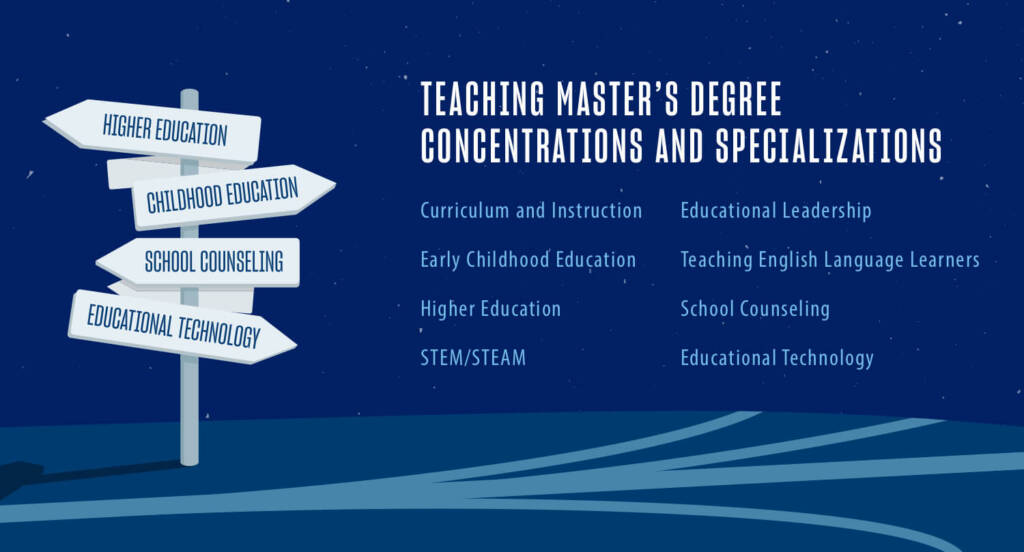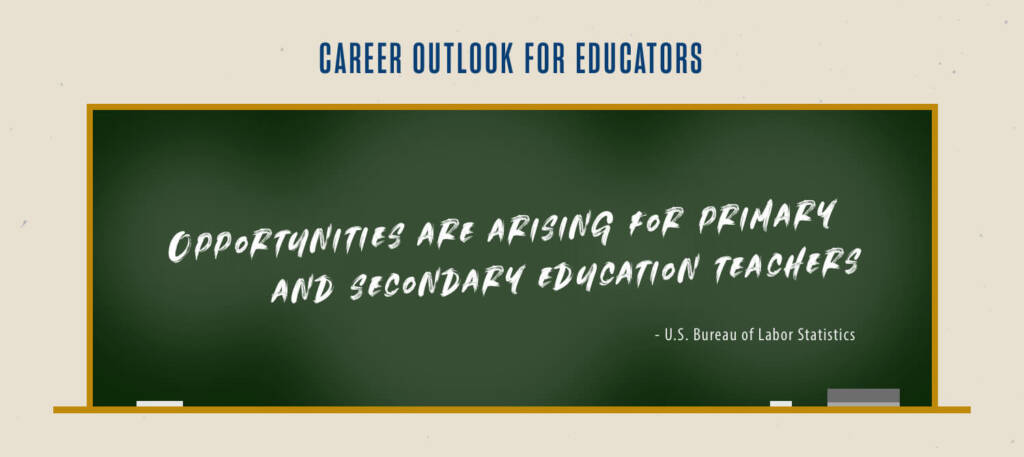Teachers love to learn.
In fact, 51% of all U.S. public and private school teachers1 report having a master’s degree, and 8.4% report having an education specialist degree (more on that later in this post).
For the many who have earned their teaching master’s degree — and the many more who aspire to do so — a passion for knowledge and the desire to be an even better teacher are among the key motivators.
Whether it’s a Master of Education (MEd), a Master of Arts in Teaching (MAT) or one of the many degree programs that focus on a specific subject area, there is a wide range of master’s degrees for teachers to choose from.
If you are among the many educators who are considering earning a graduate degree, read on to explore the best master’s degrees for teachers depending upon your goals, interests and more.
This report will also examine some of the many benefits of earning your master’s in education, as well as the potential advantages of enrolling in an online teaching master’s degree program.
Why Should Teachers Get a Master’s Degree?

There is a wide range of reasons and benefits that motivate teachers to earn their master’s degree. These include:
- The desire to become an even better teacher
- Making a greater impact in the lives of your students
- Reinvigorating your passion for your profession
- Developing a deeper understanding of educational theories and strategies
- Building a foundation for educational leadership opportunities
- Positioning yourself for a possible pay increase
- Strengthening your position in the competitive job market
Master’s Degree Options for Teachers
The following are some of the top masters degree options for teachers:
Master of Education
Perhaps the most common master’s degree among teachers, a Master of Education (MEd) degree has long been a favored option for educators who wish to expand their understanding of teaching theories, pedagogy, strategies and more. This degree is ideal for teachers seeking new ways to make a greater impact in the lives of their students, as well as those with aspirations of expanding their career beyond the classroom — for example, becoming a school principal, designing curriculum, working in a college or university setting or positioning yourself for business roles such as a corporate trainer.
Master of Arts in Education
While it sounds similar to an MEd, a Master of Arts (MA) in Education is distinguished by its theoretical approach to education. This type of degree program focuses on the philosophical, social, psychological and even historical foundations of teaching, as opposed to the technical application of educational principles. An MA in Education is an ideal option for someone who wants to work in educational reform, diversity and inclusion in schools, educational research or pursue a terminal degree. Depending on the university, an MA program may also focus on teaching the liberal arts and humanities.
Master of Science in Education
Conversely, a Master of Science (MS) in Education prioritizes the technical application of educational methods. Due to the practical nature of the program, an MS in Education may be the best degree option for educators who want to teach in the STEM fields (science, technology, engineering and mathematics).
Master of Arts in Teaching (MAT)
Like the MS in Education, a Master of Arts in Teaching (MAT) is designed to equip current and prospective teachers with the practical, hands-on skills needed to be effective in the classroom. And like the MEd, it can also be a great way to gain additional subject-specific skills and strategies in such areas as Elementary and Secondary Education, Special Education, Gifted & Talented Education and more. If you are looking to change careers to become a teacher, the MAT can help prepare you for initial licensure in your state. MAT programs typically include a required student teaching component, which will enable you to practice in and experience an actual classroom.
Master’s in English Education
A master’s degree in English Education (offered as a specialization at some institutions) is typically focused on helping teachers develop a deeper understanding of how students learn the English language and communicate through reading and writing. This is especially helpful for those seeking to teach English to non-native speakers, including in English as a Second Language (ESL) and Teaching English to Speakers of Other Languages (TESOL) programs. Curriculum focus may include emphasis on language-learning theory, as well as insights, activities and techniques for use in the classroom.
Master’s in Mathematics Education
This graduate degree program (or master’s degree specialization option) is helpful for teachers seeking to improve their ability to teach middle and high school students the math skills needed to succeed in academics, in the workplace and in life. Programs focused on teaching secondary students are likely to highlight strategies for helping pupils understand such disciplines as algebra, geometry, calculus and trigonometry.
Master’s in Special Education
Special education teachers are motivated by a desire to provide specialized instruction designed to meet the unique learning needs of students with a range of challenges or disabilities. Advanced degree programs in special education, often taught as a specialization with an M.Ed. program, typically focus on effective teaching techniques and strategies for creating meaningful learning experiences for these children, as well as developing lesson plans that address students’ specific disabilities.
[RELATED] Inclusive Learning in the Classroom: How to Create the Right Environment >>
Master of Education Degree Concentrations and Specializations

MEd in Curriculum and Instruction
A specialization in curriculum and instruction is often considered one of the most flexible options when it comes to selecting a concentration option in a Master of Education degree program. Focused on a range of topics including educational theory, student data evaluation and much more, it is often chosen by educators who aspire to become a curriculum developer or instructional coordinator.
MEd in Early Childhood Education
Are you curious about how the actions of young children connect to their cognitive capabilities, learning styles and academic and emotional growth? Master’s degree programs in this area of study include a focus on combining strong observational and analytical skills to develop strategies to help students learn. In addition to classroom teaching, educators who opt to focus their graduate studies on early childhood education often become academic scholars or public policy advocates and specialists.
MEd in Higher Education
This field of study explores the unique needs of post-secondary students and offers guidance on how to help them achieve both academic excellence and personal development. Such programs typically focus on various aspects of educational leadership and are often selected by educators who are interested in the college or university administration track or in working for nonprofits or agencies that help shape higher education policy.
MEd in Educational Leadership
Earning a master’s degree with a specialization in educational or school leadership is a common pathway for those interested in working as principals, superintendents or in other administrative roles. Areas of focus include instructional leadership, ethical and professional norms, educational equity, meaningful engagement with families and communities, data-driven decision making and more. The emphasis on leadership is also valuable in fields outside of education.
[RELATED] 10 Traits of Successful School Leaders >>
MEd in Teaching English Language Learners
The practice of teaching English to non-native speakers goes by a number of different names — ESL (English as a Second Language), ELL (English Language Learners), TESOL (Teaching English to Speakers of Other Languages) — and is a sought-after specialty that applies to young students as well as adult learners. Bilingual education is vitally important when it comes to helping students of all ethnic and cultural backgrounds succeed in school and in life. Specializing in this field can also create opportunities for educators who are interested in working as English teachers in other countries.
MEd in School Counseling
Always in demand, school counselors are an important presence at most elementary, middle and high schools. Areas of focus include working with K-12 students who are experiencing challenges inside or outside of the school environment or exhibiting problematic behaviors. But this diverse role also typically includes helping secondary students with academic achievement, career development and college admissions. In both scenarios, counselors need to be good listeners while providing valuable guidance for educational achievement and overall success.
MEd in Educational Technology
A master’s degree specializing in educational technology provides a comprehensive understanding of how ongoing technological breakthroughs connect to providing the most enriching educational experience. It also helps teachers prepare students for success in our increasingly digital world. Such programs cover both theoretical aspects of incorporating technology into the educational experience, as well as the countless new tech tools teachers can now use to enhance student learning.
[RELATED] What is Educational Technology? [Definition, Examples & Impact] >>
MEd in STEM/STEAM
The STEAM master’s degree specialization takes STEM (science, technology, engineering and mathematics) to the next level by adding arts (liberal, social, manual, physical and fine arts) to the framework for integrated instruction. STEAM empowers teachers to employ a project-based learning approach that crosses all of these disciplines in solving everyday problems. Increasing emphasis on STEAM education connects to the belief that it establishes a foundation for innovation in key areas essential to individual success and human progress.
What You Can Do With a Master’s Degree for Teachers
Master’s degrees for teachers can also be a great investment when it comes to positioning yourself for a range of additional opportunities outside the public school classroom. For example:
- Administrative positions in K-12 schools, as well as at colleges and universities
- Post-secondary instructor and professor roles
- Curriculum development specialists
- Media and technology specialists
- Corporate trainers
- Private tutors
- Educational policy analysts
- Child care directors
- Educational coordinator roles in museums and cultural organizations
[RELATED] 10 Tips for Earning Your Master’s Degree While Teaching Full Time >>
Career Outlook for Educators

There’s plenty of opportunity out there for educators — according to the Bureau of Labor Statistics, there will be roughly 857,600 annual job openings2 in the field from now until 2032. Though great teachers are always in demand, this means the need is greater than ever for motivated educators to enter the field or enhance their current skill set.
This, coupled with the possibility of wage premiums for those with graduate degrees, makes now the perfect time to pursue an advanced degree.
According to the National Education Association, teachers with a master’s degree can earn a starting salary that is 8.7% higher3 than someone with a bachelor’s degree in education. Earning potential varies by grade level and specialization, but earning a master’s degree nets a higher starting salary across the board. Many schools will also sponsor teachers or subsidize their tuition to offset the cost of attending classes while working, and there are many graduate scholarships and grants available.
Opportunities to earn your teaching master’s degree online now provide additional incentive to act on your desire to go back to school. High-quality programs like the University of San Diego’s online Master of Education degree are designed to give you maximum flexibility to balance your studies with the demands of work and everyday life.
Frequently Asked Questions
Sources
1National Center for Education Statistics 2023, Fast Facts: Teacher Qualifications, https://nces.ed.gov/fastfacts/display.asp?id=58
2Bureau of Labor Statistics 2023, Occupational Outlook Handbook: Educational Instruction and Library Occupations, https://www.bls.gov/ooh/education-training-and-library/home.htm
3National Education Association 2022, Teacher Salary Benchmarks, https://www.nea.org/resource-library/teacher-salary-benchmarks





